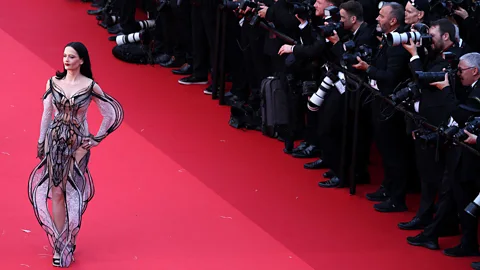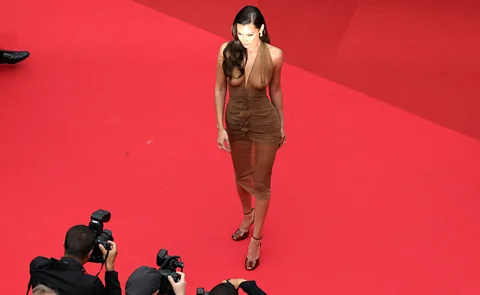But for others, who perhaps hold a more generous view of the artistry of fashion, that isn’t the most salient point. Given the announcement about the banning was made just a day before the festival, when outfits will have been being planned for months, some commentators spared a thought for fashion industry workers. “Thoughts and prayers to all the stylists,” wrote style writer Louis Pisano on Instagram. “It is a low blow,” said Besovic. “It shows how much you don’t respect the people who are attending your festival… especially the stylists… You couldn’t have done this two months ago?” Halle Berry, herself a fan of a naked dress on the red carpet, has already fallen foul – she reportedly had a voluminous dress planned that she now “can’t wear because the train is too big”. However, the US star added: “I had to make a pivot. But the nudity part I do think is probably also a good rule.”
 Getty Images
Getty ImagesFor some, though, the side of the ban dealing with volume makes more sense than the nudity. As Cannes veteran Pisano described, speaking to Vogue Business, in recent years the carpet has been overwhelmed with influencers intentionally wearing the “craziest, most insane, biggest thing they can find… They take up the most space on the red carpet and,” with thousands of people needing to get into the cinemas, “everybody gets clogged up”. This is not the first time the Cannes Film Festival has implemented a ban designed to speed things up. In 2018, the festival’s artistic director, Thierry Frémaux, banned the selfie, telling Le Film Français magazine that, “on the red carpet, the trivial aspect and the slowing down provoked by the disorder which these selfies create tarnishes the quality of [the red-carpet experience] and of the festival as a whole”.
So will Cannes really police this ban? While the festival has outlined that “welcoming teams will be obligated to prohibit red-carpet access to anyone not respecting these rules,” it remains to be seen how evenly that will be enforced. Because, despite setting such strict guidelines in the past, it hasn’t always been democratically good at applying them. In 1953, Pablo Picasso obtained special dispensation to wear a sheepskin coat in violation of the evening dress code. A journalist the same year was given no such privilege. On another occasion, no such allowances were made for Henry Miller, who, in 1960, refused to obey the code and, despite being a member of the jury, was turned away from the opening evening because he wasn’t wearing a dinner jacket.
The fact that all of this information is courtesy of the Cannes Festival website hints that there is at least some pride in creating a fuss via a dress code that they know full well a few will choose – and fewer will be allowed – to flaunt.
 Getty Images
Getty Images“Rumour has it,” according to Style Not Com, that “it won’t apply to the real stars of the carpet. The models and brand ambassadors who show up for the photo op, skip the screening and slip out the back. Which, let’s be honest, is most of them.” More likely is that a few influencers, wearing dresses the size of Citroën cars, will be shown the red carpet off-ramp.
If history tells us anything, those who do disobey and get away with it will be judged kindly in the public eye. Because disobeying a dress code considered to be draconian, snobbish or patriarchal has in the past amassed kudos for Hollywood stars who, in that moment, signal their approachability. Take Julia Roberts, who went barefoot in 2016, a year after flat shoes were disallowed. The move won her the title of “America’s sweetheart” in Vanity Fair. Then in 2018 Kristen Stewart kicked off her Louboutins on the red carpet, having previously said to the Hollywood Reporter: “If you’re not asking guys to wear heels and a dress, you cannot ask me either.” Will those freeing the nipple – and getting away with it – receive similar praise?